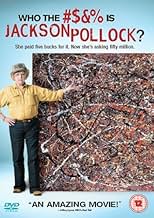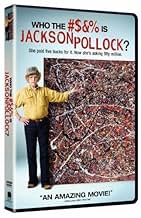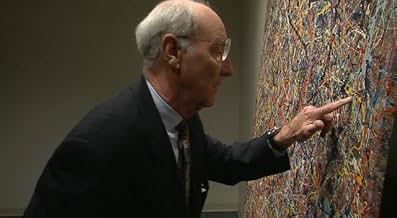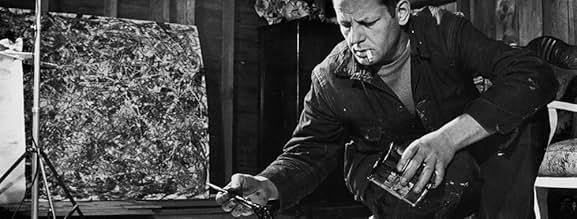IMDb RATING
7.0/10
1.3K
YOUR RATING
In this documentary, veteran filmmaker Harry Moses exposes the controversy in the world of high priced artwork. He paints a vivid picture of how art is bought and sold in America.In this documentary, veteran filmmaker Harry Moses exposes the controversy in the world of high priced artwork. He paints a vivid picture of how art is bought and sold in America.In this documentary, veteran filmmaker Harry Moses exposes the controversy in the world of high priced artwork. He paints a vivid picture of how art is bought and sold in America.
- Director
- Writer
- All cast & crew
- Production, box office & more at IMDbPro
Featured reviews
Documentary about one Teri Horton, a 73-year-old former truck driver (with a colorful and precarious past) who bought a peculiar painting one day in a California thrift shop--only to discover it might be a lost masterwork from famed artist Jackson Pollock. Horton, eager to sell the painting and get on her feet financially, is unable to convince the skeptical art world of her treasure, with naysayers far outweighing the handful of experts who find evidence the painting is indeed a Pollock (the artist left the work unsigned, though a fingerprint on the back is an exact match to the now-deceased maestro). Elements of Pollock's life are explored and intersected with Horton's own background; she tells at one point of a suicide attempt that went amusingly wrong, and her no-nonsense manner and pithy, seen-it-all demeanor are both funny and touching. Short at 74 minutes, the documentary is entertaining, perhaps minor, though a testament to the stubborn human spirit. Offered nine million dollars at one point, Horton refused to give the painting up, wanting her share of the American dream for what it is rightfully going for on the artists market. **1/2 from ****
There's this old joke about a small town exhibit of Norman Rockwell paintings where a snobbish big city critic is trashing the art at every turn.
"We know why you don't like this art". says a local.
"And why is that?" asks the critic.
"Because we don't need you to tell us if it's any good!"
And thus, this film begs the question, "Is collecting modern art about art or collecting autographs?"
This HBO documentary details the adventures of Teri Horton (Tugboat Annie of the Trailer Park and professional dumpster diver); a small town gal finding herself in possession of what might very well be an original Jackson Pollock potentially worth millions and sets out to prove its authenticity. Herein lies the rub of modern art; "If you don't know who did it, is it any good"? We watch as the painting is wagged from pompous art critics to curious aficionados, business persons and forensic specialists each with their own take and assessment of authenticity. Little of which has anything to do with the actual art on the canvas.
Here is a fascinating look at the facade of modern art and the stuffed shirts who make cowardly proclamations regarding authenticity while avoiding the content of the painting itself.
Interesting stuff whether you like modern art or not; and while Ms. Horton's rural irascibility wears mighty thin by the end of the film, there's enough fun and insight to give anyone an art lesson.
"We know why you don't like this art". says a local.
"And why is that?" asks the critic.
"Because we don't need you to tell us if it's any good!"
And thus, this film begs the question, "Is collecting modern art about art or collecting autographs?"
This HBO documentary details the adventures of Teri Horton (Tugboat Annie of the Trailer Park and professional dumpster diver); a small town gal finding herself in possession of what might very well be an original Jackson Pollock potentially worth millions and sets out to prove its authenticity. Herein lies the rub of modern art; "If you don't know who did it, is it any good"? We watch as the painting is wagged from pompous art critics to curious aficionados, business persons and forensic specialists each with their own take and assessment of authenticity. Little of which has anything to do with the actual art on the canvas.
Here is a fascinating look at the facade of modern art and the stuffed shirts who make cowardly proclamations regarding authenticity while avoiding the content of the painting itself.
Interesting stuff whether you like modern art or not; and while Ms. Horton's rural irascibility wears mighty thin by the end of the film, there's enough fun and insight to give anyone an art lesson.
This documentary is one of the most interesting ones I have ever seen. It's about an elderly woman who happens to drive a 16-wheeler truck for a living and who lives in a trailer park who buys what she believes is a Jackson Pollock painting from a thrift shop for $5. When she takes the painting to renowned art dealers, she is met with snobbery and disbelief that the painting is authentic. It's as much a tale about the clashing of the ultra rich high class society versus the the low class and least cultured society. There is a nice scene where a country musician sings to the woman and a group of her friends as they munch on chicken wings, smoke cigarettes and drink beer. On the flip side, the art experts all talk in pompous-accents. The most intriguing element of the story, however, is the forensic investigator who the woman hires to see if there is any evidence that can link Pollock to the painting. This documentary is a must see. Rating 8 of 10 stars.
This one certainly makes good entertainment - which may be half the trouble.
It's the story of a California grandmother buying an abstract painting in a junk-shop for $5, and then being tipped-off that it looks like an original Jackson Pollock, worth up to $50 million, if proved genuine.
You don't have to dig very deep into the story before it starts to rattle, and not only because California is the natural habitat for wild theories of this sort. There is just too much of the pantomime about it all. The woman in question (Teri) is a long-distance truck-driver, who looks surprisingly genteel for one of that trade, as though she is posing as trailer-trash, with philistine opinions about abstract art - as echoed in the somewhat bowdlerised title of the film. She claims that a picture ought to 'look like something'. Well then, why choose such an unlikely present for a friend, when she could have found a nice harmless landscape or a bowl of fruit?
On come the experts, who are quick to remind us about 'provenance' - a word she claims she has never heard before. Thomas Hoving of the New York Met talks in an impossibly conceited way about his status as an authenticator of paintings, clearly acting a snob character-part, to get us taking sides in the big contest: connoisseurship v. folksy fireside wisdom.
Well, we certainly do take sides, even sometimes changing sides, as the evidence gradually comes to light. Apparently fingerprints have a lot to do with it, since Pollock despised the brush and palette. They even bring in a fingerprint expert from the Canadian Mounties - another over-theatrical touch. Two of the so-called experts insist that the painting is genuine, but it turns out that both of them were previously jailed for fraud. It is even claimed that the painting doesn't show enough evidence of Pollock's permanent drunkenness on the job!
Unfortunately, the closer you look at Teri, the more you conclude that she is just a little unhinged altogether. When she finally understood what provenance meant, she invented a colourful ancestry for the painting, and at least one expert swallowed it whole. Last heard-of, she had turned down a $9 million offer, still holding out for the big fifty, even though authentication is looking more elusive than ever. And it will take more than Joe Beam and his (excruciating) country song about her to get me voting against the smart-and-smarmy experts, as I believe I'm meant to.
It's the story of a California grandmother buying an abstract painting in a junk-shop for $5, and then being tipped-off that it looks like an original Jackson Pollock, worth up to $50 million, if proved genuine.
You don't have to dig very deep into the story before it starts to rattle, and not only because California is the natural habitat for wild theories of this sort. There is just too much of the pantomime about it all. The woman in question (Teri) is a long-distance truck-driver, who looks surprisingly genteel for one of that trade, as though she is posing as trailer-trash, with philistine opinions about abstract art - as echoed in the somewhat bowdlerised title of the film. She claims that a picture ought to 'look like something'. Well then, why choose such an unlikely present for a friend, when she could have found a nice harmless landscape or a bowl of fruit?
On come the experts, who are quick to remind us about 'provenance' - a word she claims she has never heard before. Thomas Hoving of the New York Met talks in an impossibly conceited way about his status as an authenticator of paintings, clearly acting a snob character-part, to get us taking sides in the big contest: connoisseurship v. folksy fireside wisdom.
Well, we certainly do take sides, even sometimes changing sides, as the evidence gradually comes to light. Apparently fingerprints have a lot to do with it, since Pollock despised the brush and palette. They even bring in a fingerprint expert from the Canadian Mounties - another over-theatrical touch. Two of the so-called experts insist that the painting is genuine, but it turns out that both of them were previously jailed for fraud. It is even claimed that the painting doesn't show enough evidence of Pollock's permanent drunkenness on the job!
Unfortunately, the closer you look at Teri, the more you conclude that she is just a little unhinged altogether. When she finally understood what provenance meant, she invented a colourful ancestry for the painting, and at least one expert swallowed it whole. Last heard-of, she had turned down a $9 million offer, still holding out for the big fifty, even though authentication is looking more elusive than ever. And it will take more than Joe Beam and his (excruciating) country song about her to get me voting against the smart-and-smarmy experts, as I believe I'm meant to.
This movie is a hoot. A hilarious look at the art market but also an endearing portrait of a tough little lady, Teri Horton. Something for everyone--well, except art critics who believe that an artist´s fingerprint on the back of a canvas is no substitute for a signature! I absolutely enjoyed watching this story play out and found the pacing and perspectives to be very well planned by the director. In addition to the sheer entertainment vaiue, the film provides lots of food for more serious thought. Why do certifiably ¨genuine¨ paintings by artists essentially christened saints fetch offers of many millions of dollars, while paintings which might be by those same artists, but also might not, are considered worthless?
Did you know
- Quotes
Teri Horton: Everybody knows that a fairy tale starts out 'Once Upon a Time', but a truck drivers tale starts out you 'ain't gonna believe this shit'!
- ConnectionsFeatures Mildred Pierce (1945)
Details
- Release date
- Country of origin
- Official site
- Language
- Also known as
- Finding Jackson Pollock
- Production companies
- See more company credits at IMDbPro
Box office
- Gross US & Canada
- $13,710
- Opening weekend US & Canada
- $5,526
- Nov 19, 2006
- Gross worldwide
- $13,710
- Runtime
- 1h 14m(74 min)
- Color
- Sound mix
- Aspect ratio
- 1.85 : 1
Contribute to this page
Suggest an edit or add missing content











